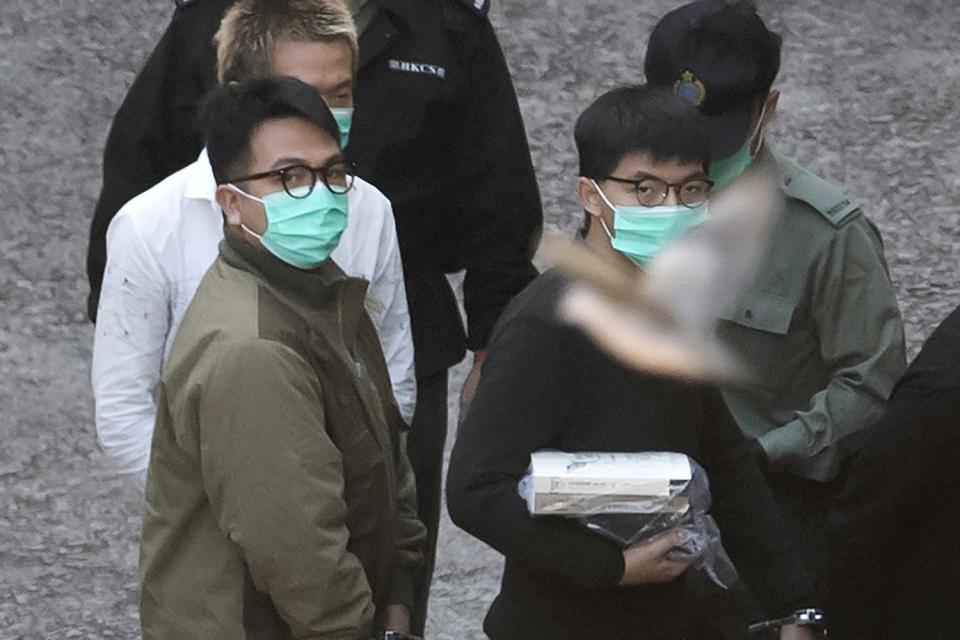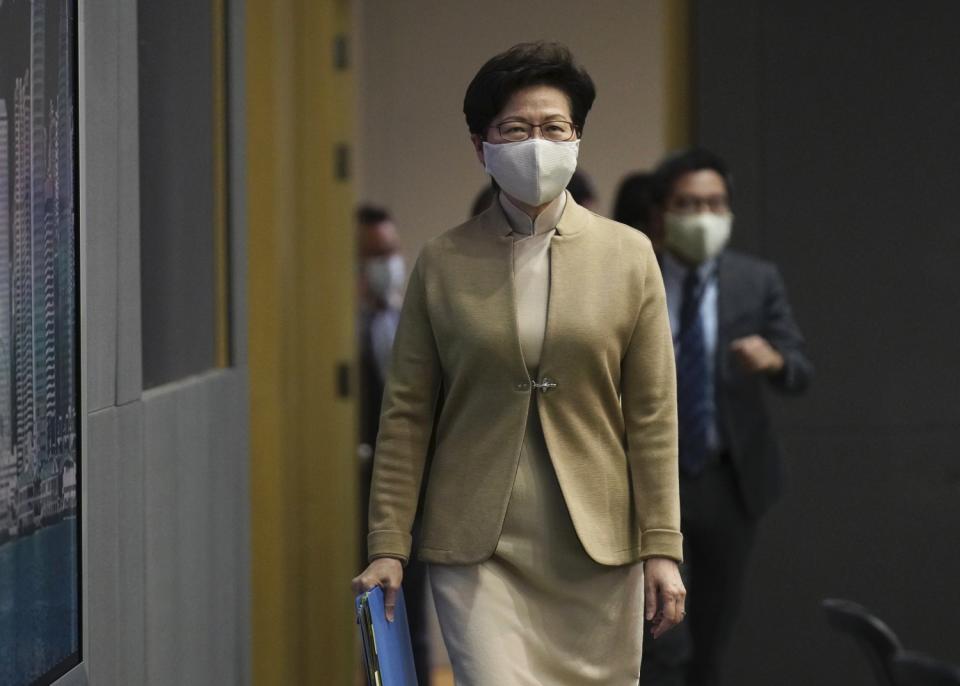A Hong Kong pastor tried to protect democracy activists. Now his bank account is frozen

During the height of Hong Kong’s protests last year, Pastor Roy Chan led a ragtag crew of middle-aged and elderly church volunteers who would turn up at pro-democracy demonstrations wearing yellow vests with Chinese characters on the back that read, “Protect the children.”
They’d form human chains to try to block police from reaching the mostly teenage and college-age protesters, shouting: “Beat us, don’t beat the kids!”
At times, the authorities obliged. Many of the volunteers, including an 83-year-old known as Uncle Wong, were tear-gassed and pepper-sprayed.
Chan and his church say they now are paying a price for that activism.
Last week, while in Britain, the 39-year-old pastor went online and discovered that bank accounts belonging to him, his wife and the Good Neighbor North District Church had been frozen. The next day, he learned police had raided the church’s two locations and arrested a staffer and a former director.
Chan and his wife are accused of fraud and money laundering for underreporting millions in church donations — charges he denies.
“We are a registered charity organization. We’ve done everything lawfully,” said Chan, who is living in an undisclosed location in Britain indefinitely with his wife and three young daughters.
The frozen accounts at HSBC Bank were discovered a day after Hong Kong’s new national security police department confirmed it had ordered the suspension of bank accounts belonging to former pro-democracy legislator Ted Hui, his parents and his wife. Hui was accused of misusing crowdfunded donations and is now self-exiled in Britain. He denies the charges.

The actions targeting government opponents' finances have sent a chill across the territory, showcasing how easily personal assets and multinational banks could be swept up in China’s crackdown on dissent.
The Hong Kong government denied the moves were politically motivated, but experts said the city’s standing as the premier banking center in Asia would be jeopardized if China’s national security law were seen as a cudgel for economic coercion.
“The reason why this wasn’t done before is because China did not have the legal instrument … to compel financial institutions in Hong Kong to do things like this,” said Victor Shih, a UC San Diego expert on China’s financial policies. “Now that they have it, they’re beginning to exercise it in a pretty wide-ranging way, which can easily become even more wide-ranging.”
The freezing of the accounts comes as Hong Kong’s autonomy from China under a "one country, two systems" framework has been steadily dismantled amid a purge of critics from the media, government and education system.
Hong Kong’s legislature is now bereft of opposition members after pro-democracy lawmakers resigned en masse last month to protest the disqualification of four colleagues. Prominent pro-democracy activists Joshua Wong, Agnes Chow and Ivan Lam received jail terms recently ranging from seven months to a year for their roles in last year's protests.
And last weekend, media tycoon Jimmy Lai, a persistent irritant to Beijing, was led in shackles to a courthouse where he was charged with colluding with foreign powers via Twitter.
Once thought of as a haven on China’s doorstep, Hong Kong is now more beholden than ever to the tightening grip of the Chinese Communist Party. That fundamentally changes the city’s relationship with foreign companies, ordinary Hong Kongers planning their futures and the untold number of mainland Chinese who parked their wealth in the former British colony thinking it was insulated from authorities across the border.
“My friends in the U.K. have been telling everyone to move their money out of Hong Kong,” said Simon Lee, co-director of the international business and Chinese enterprise program at the Chinese University of Hong Kong. “In terms of the safety of assets, Hong Kong is no different from China now.”
Still, Hong Kong plays a vital role as a conduit for capital into and out of China. As long as the Chinese yuan isn’t freely exchanged overseas, China will need Hong Kong as a clearinghouse for foreign currency. The city also boasts one of the biggest stock markets in the world.
But geopolitical tensions are roiling the territory’s financial institutions. The U.S. has imposed sanctions on more than a dozen Chinese officials, including Hong Kong Chief Executive Carrie Lam, for their role in assailing the Chinese territory's autonomy. Lam said she no longer has access to banking services and must stockpile cash at home.
The U.S. is able to exert such pressure because the dollar remains the globe’s reserve currency, and no bank — even state-owned Chinese ones — can afford to be cut off. The U.S. also holds considerable sway over the networking system needed to transfer funds around the world, known as SWIFT.

Caught in the middle are multinational banks, which are bound to the U.S.-dominated financial system but can’t afford to anger an increasingly antagonistic Beijing because of the size of the Chinese market.
Few firms exemplify this conundrum better than HSBC, the British banking behemoth that was founded in 1865 in Hong Kong by Scottish trader Thomas Sutherland in the aftermath of the second Opium War.
Although the company is headquartered in London, the bulk of the bank's business is in Hong Kong and mainland China.
The bank, which still operates its Hong Kong offices out of its Norman Foster-designed tower overlooking Victoria Harbor, was criticized in China for cooperating with U.S. investigators in the indictment of Huawei Chief Financial Officer Meng Wanzhou. It was later pilloried in Hong Kong by pro-Beijing figures for not supporting the national security law early on.
When its top executive in Asia signed a petition in June to back the law, the bank became the target of protesters, who vandalized some HSBC branches and defaced the two signature lion statues guarding its headquarters.
Then came revelations this month that some of the frozen accounts linked to Chan and Hui were at HSBC.
That sparked outrage among pro-democracy supporters, who accused the bank of bending to Beijing’s will.
“This incident is of a serious nature and affects the confidence of not only my family's assets, but of all HSBC customers in Hong Kong and the world,” Hui wrote in a Facebook post. “Under the National Security Law, how much [are] the banks and the business sector willing to sacrifice for the service of the regime?”
HSBC said it could not comment on individual cases.
Lee, of the Chinese University of Hong Kong, said the bank had to abide by the terms of the national security law.
“The definition of illegal activities are quite broader now,” Lee said. “If a person makes a donation to an organization's bank account and that person is proven to participate in illegal activities under the national security law, the bank concerned will be liable.”
If a dissident with a frozen account were to challenge a bank like HSBC, it could set up a confrontation over whether Western or Chinese laws would prevail in dueling jurisdictions.

“It’s just a matter of time,” said Shih, of UC San Diego. “If both sides decide to use financial sanctions as a tool of statecraft, inevitably you will have lawsuits. You will have a clash of legal dictates from the different countries.”
Chan, the pastor, said he was considering filing a case in British court, though he was preoccupied with more immediate concerns such as feeding his family now that he had lost access to his bank.
A former social worker who found religion counseling young triad gang members, Chan said the bank's action would have a chilling effect on Hong Kong’s churches, many of which are flush with donations in a city brimming with wealth.
Good Neighbor North District Church, which also ran homeless shelters, was targeted for distributing food and providing medical attention at the protests and offering shelter to youngsters who had fled their homes after clashing with their parents over politics, Chan said.
He’s unsure if he’ll ever be able to return to Hong Kong. Uncle Wong is urging Chan to stay in Britain. But Chan worries about his mother’s safety because of his legal trouble. (He was vague about how he had the good fortune to plan a sabbatical in Europe shortly before the police raid.)
Chan hopes HSBC will eventually release his funds but has little regret banking with the firm, which has more than 5 million customers in a city of 7.5 million.
“I’m a Hong Konger, of course I use HSBC,” he said. “There’s not much other choice. I trusted them, but they’re being political and trying to work with the system. It’s disappointing.”
This story originally appeared in Los Angeles Times.

